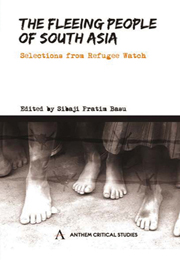Book contents
- Frontmatter
- Contents
- Acronyms and Abbreviations
- Foreword by Ranabir Samaddar
- Preface
- ETHICAL ISSUES
- LAWS
- Introduction
- Human Rights, Humanitarian Laws and the Continuing Displacement in Sri Lanka
- The Foreigner and the Right to Justice in the Aftermath of September 11th
- Exclusion from Refugee Protection in Europe: An Attempt at Legal Conceptualization
- Women's Rights, Asylum Jurisprudence and the Crises of International Human Rights Interventions
- Strengthening Protection of the IDPs
- French Suburbia 2005: The Return of the Political Unrecognized
- SOUTH ASIA
- INDIA
- GENDER
- INTERVIEW/CORRESPONDENCE
- REPRESENTATIONS
- Index
Strengthening Protection of the IDPs
from LAWS
Published online by Cambridge University Press: 05 March 2012
- Frontmatter
- Contents
- Acronyms and Abbreviations
- Foreword by Ranabir Samaddar
- Preface
- ETHICAL ISSUES
- LAWS
- Introduction
- Human Rights, Humanitarian Laws and the Continuing Displacement in Sri Lanka
- The Foreigner and the Right to Justice in the Aftermath of September 11th
- Exclusion from Refugee Protection in Europe: An Attempt at Legal Conceptualization
- Women's Rights, Asylum Jurisprudence and the Crises of International Human Rights Interventions
- Strengthening Protection of the IDPs
- French Suburbia 2005: The Return of the Political Unrecognized
- SOUTH ASIA
- INDIA
- GENDER
- INTERVIEW/CORRESPONDENCE
- REPRESENTATIONS
- Index
Summary
UN Secretary General Kofi Annan drew attention to ‘the growing problem of internally displaced persons’ (IDPs) in his 2005 report on UN reform, In Larger Freedom. Unlike refugees, IDPs do not cross international borders and thus have no well established system of international assistance or protection. IDPs, Annan wrote, ‘often fall into the cracks between different humanitarian bodies’. Despite this acknowledgement of the predicament of IDPs, nowhere in the 2005 UN World Summit document, adopted by heads of government in September, does it spell out how to improve the UN's ability to address the plight of the 20 to 25 million people uprooted within their own countries by violence, ethnic strife and civil war. UN reform must encourage greater national and international involvement with IDPs by promoting the Guiding Principles on Internal Displacement, giving the UN High Commissioner for Refugees (UNHCR) a broader role with IDPs, and strengthening institutional and military arrangements to defend the physical safety of IDPs.
The millions of people caught in the midst of violent conflict without the basic necessities of life present a political and strategic concern, not to mention a profound humanitarian and human rights problem, requiring international action. Conflict and massive displacement can disrupt stability, turn countries into breeding grounds for lawlessness and terrorism, and undermine regional and international security. […] Unless addressed, situations of displacement can create political and economic turmoil in entire regions.
- Type
- Chapter
- Information
- The Fleeing People of South AsiaSelections from Refugee Watch, pp. 119 - 128Publisher: Anthem PressPrint publication year: 2009



